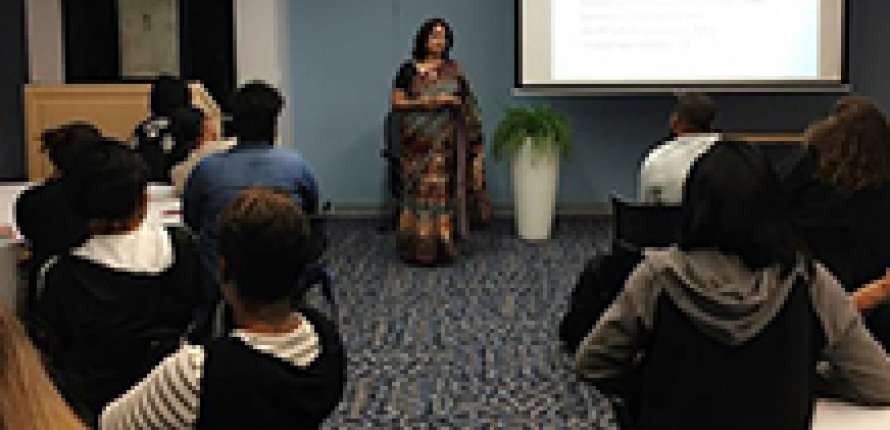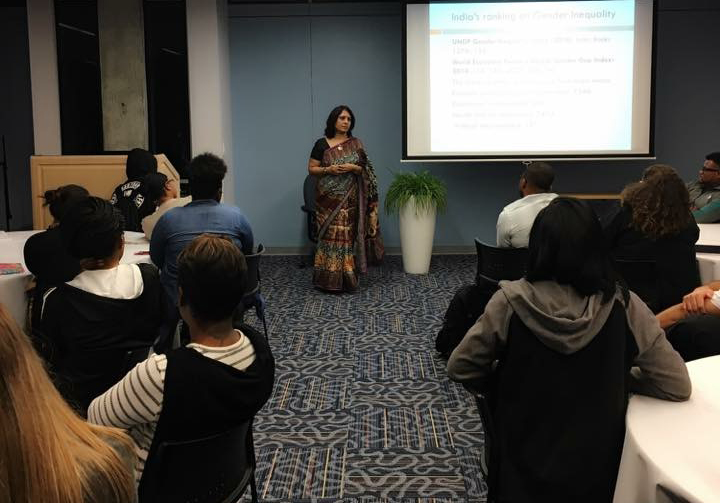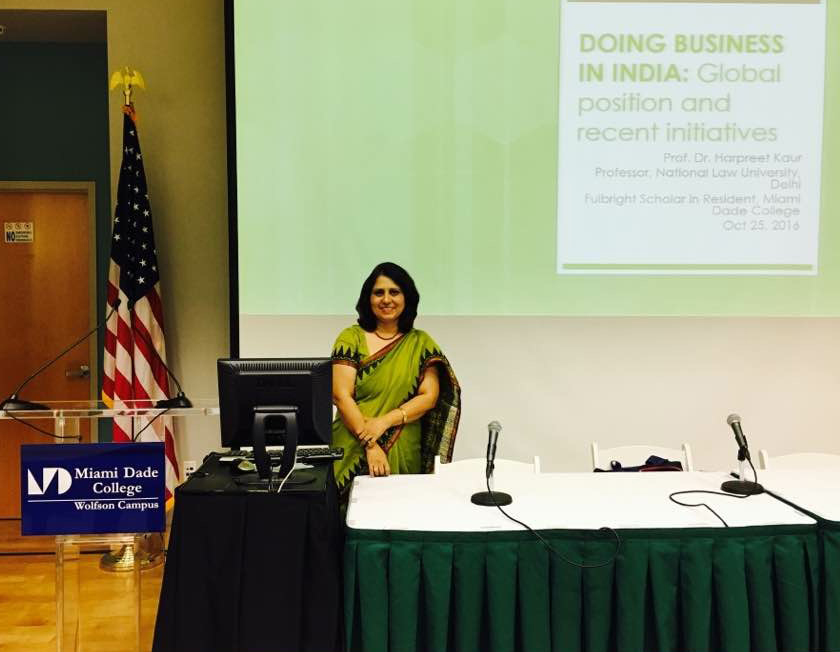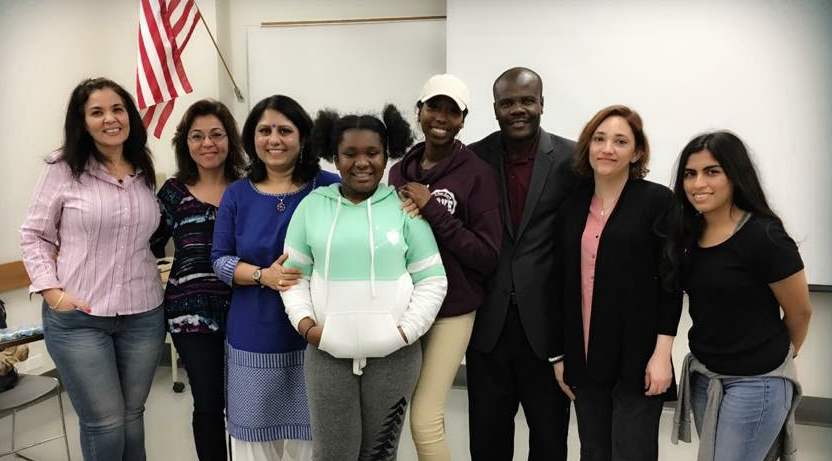Fulbright Scholar-in-Residence Continues to Impact Miami Dade College

Danixia Cuevas, Professor of Law, Miami Dade College
2013-2014 Fulbright U.S. Scholar to India
The Fulbright Scholar-in-Residence (S-I-R) Program helps institutions advance their international presence by offering them grants to host non-U.S. scholars for teaching. We reached out to Fulbright U.S. Scholar Alumni Ambassador Danixia Cuevas to hear about the impact of hosting a S-I-R.
How did you and Miami Dade College first hear about the Fulbright Scholar-in-Residence Program?
When I was a Fulbright-Nehru Scholar to India at the National Law University-Delhi in 2013, I first became aware of the Fulbright Scholar-in-Residence program. While at NLU-Delhi, I developed a close relationship with my faculty coordinator, Dr. Harpreet Kaur. During my time at NLU-Delhi, Dr. Kaur and I began to develop post-Fulbright projects. Upon my return to MDC, we designed a project to have our respective students create a company incorporated in India. Our students worked on this project for one year, at the end of which they decided to create a coffee company, “Cafecito LLC,” with headquarters in Miami but which would be franchised in India. In order to complete this project, students conducted extensive research and comparative analysis regarding both Indian and American corporate laws. They even offered an initial public offering of Cafecito LLC.
Dr. Kaur and I decided to continue this relationship by requesting that Miami Dade College host her as a Fulbright S-I-R. The administration at MDC agreed, as they understood that MDC could establish a long-term academic partnership between our respective institutions.
What was the application process like?
The application process was comprehensive and required advanced planning in order to engage and get support from the stakeholders, including those from within the institution as well as from the community at large.

What did Dr. Kaur do on campus? What was the hosting experience like?
The opportunity to host a S-I-R was transformative for the students and faculty. Students learned about India from both academic and cultural perspectives. They had the opportunity to participate in lectures regarding comparative legal topics such as business law. They also learned about women in India, cultural norms, and business practices in India. These were unique opportunities, which enriched our students beyond measure.
Students and faculty both consulted with her to learn more about India, the laws and the people. They were eager to learn about Indian food and culture as well. In one class that she and I co-taught, a young lady connected with her from the first day of class, saying that she loved Bollywood, Indian food and dancing. Throughout the semester, once we had covered the legal materials in class, students always wanted to know more about India, the culture, history and traditions.
Dr. Kaur enriched our entire MDC community. Wherever she went within Miami, her presence, from the beautiful saris that she wore, to her academic lectures regarding India, enhanced our predominantly Latino American community. Through Dr. Kaur’s interactions with the campus and the community at large, we all learned more about a culture that is not necessarily predominant in Miami. It became a true cultural exchange.

What were one or two highlights of the S-I-R experience?
From an academic standpoint, Dr. Kaur provided several lectures for the Business and Honors College on different campuses of MDC. She lectured on Conducting Business in India; Women in India; and a Comparative Analysis of Indian and American Constitutional and Corporate Law. Before leaving MDC, she recorded her lectures for the Law Center. To this day, we use Dr. Kaur's recorded lectures to globalize our curriculum.
On a personal level, Dr. Kaur enjoyed the rich Latin American diversity that exists within the city of Miami. She enjoyed Puerto Rican, Cuban and Colombian food as well as salsa and other cultural traditions celebrated widely in Miami. She also enjoyed a visit with my family to Puerto Rico and was able to see a more diverse America. She experienced major American holidays including Halloween, Thanksgiving and Christmas.
Prior to living in Miami, Dr. Kaur had never been immersed in Latin American culture. She once remarked, “I never thought that I would meet so many people from Latin America.” She was eager to learn about this diverse community and the traditions of Miami. She learned to speak some Spanish and navigated her way around the city with comfort and ease. Wherever she went she was greeted warmly. In fact, she learned the Latin American greeting of kissing someone on the cheek. This was new to her, since she had only traveled to other parts of America, where the traditional greeting is a handshake.

What was the impact of the S-I-R program on your university and students?
Dr. Kaur has continued to collaborate with the MDC Law Center as well as with students from another U.S. university. MDC students, along with Professor David Tushaus and his students from Missouri Western State University (MWSU), have engaged in an online book discussion regarding global human rights. Students have been reading a book about life in Mumbai. I met Dr. Tushaus, a 2012-2013 Fulbright U.S. Scholar to India, through the Fulbright program and introduced him to Dr. Kaur. Dr. Tushaus invited Dr. Kaur to MWSU through the Fulbright Outreach Lecturing Fund, which allows institutions that are not hosting a Visiting Fulbright Scholar to bring in a Visiting Fulbright Scholar from another campus for a short-term stay. Through this program, Dr. Kaur lectured at MWSU on Women In India and broadened her U.S. connections.
Are there ongoing collaborations with the S-I-R?
The ongoing collaborations with the S-I-R include conducting research; writing articles; delivering presentations in global conferences; and maintaining the student collaborations between both institutions.
Post Fulbright, Dr. Kaur and I have had students conducting research and creating a corporation. Their work has been facilitated via technology. Additionally, Dr. Kaur and I created a National Paralegal Training Institute. During the summer of 2016, I returned to India as a Fulbright Specialist and provided a training at NLU-Delhi, the National Paralegal Training Institute. Interdisciplinary faculty from different parts of India attended the training. The goal was to introduce paralegal education as a workforce skill development program in India that could serve to train community paralegals. These community paralegals would provide the rural poor in India with much-needed access to legal justice. Prior to this training, Dr. Kaur and I co-wrote an article and presented at an international conference held in Trivandrum, India in January 2016. Since that time, we continue to collaborate to move this effort forward as a work force skill development program in India.
Do you have any encouragement or advice for other universities who are thinking about applying to host an S-I-R?
Do not fear the application process! Program managers are dedicated to assisting applicants with the application procedure. Having a S-I-R on campus enriches the students, faculty and community at large. It also is a unique opportunity to showcase American culture to the S-I-R. The S-I-R embodies the true spirit of Fulbright – it is a cultural and academic exchange that leads to long-term relationships and a meaningful understanding of other nations.
